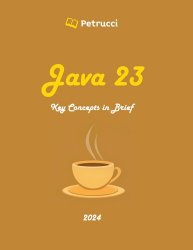Java 23 Key Concepts in Brief
- Добавил: literator
- Дата: 19-10-2024, 03:52
- Комментариев: 0
 Название: Java 23 Key Concepts in Brief
Название: Java 23 Key Concepts in BriefАвтор: Sergio Petrucci
Издательство: Petrucci Books
Год: 2024-10-02
Язык: английский
Формат: pdf (true), azw3, epub, mobi
Размер: 10.1 MB
This book provides a concise guide to the key concepts and features introduced in Java 23. It is intended for developers who are already familiar with Java and want to learn about the latest advancements in the language.
In September 2024, Oracle announced that JDK 23 is now generally available.
Java 23 introduces a number of new features and enhancements, including:
Simplified Module Imports (Preview)
Improved Beginner-Friendliness (Preview)
Enhanced Concurrent Programming (Preview)
Scoped Values for Efficient Data Sharing (Preview)
More Flexible Constructors (Preview)
Markdown Support in JavaDoc Comments
ZGC Generational Mode Now Default
Annotation Processing Changes
Security Enhancements
Performance Optimizations
Legacy Features Removed
Java 23 introduces a preview feature designed to simplify how developers import packages from modules: Simplified Module Imports. This chapter explores this new feature, its benefits, potential challenges, and how it integrates with other Java language features.
Before Java 9, managing dependencies and code organization often led to challenges like "classpath hell." Java 9 introduced the module system (Project Jigsaw) to address these issues. Modules group related packages, offering a more structured approach to application development. However, the adoption of the module system hasn’t been as widespread as initially anticipated.
For many existing Java projects, especially those with established architectures, the perceived benefits of adopting JPMS did not outweigh the costs of migration. The effort required to modularize a large, existing codebase was often deemed too high compared to the potential gains in maintainability or performance.
The Java ecosystem already had established solutions for achieving modularity, such as OSGi and Maven modules. Many developers and organizations had invested in these technologies and saw little reason to switch to JPMS, which offered similar benefits but required significant changes to their existing systems. The Java community is now split between those who have adopted JPMS and those who continue to use the classpath model or alternative modularity solutions. With fewer developers and projects using JPMS, the development of tools, best practices, and patterns for modular Java has been slower than initially anticipated. Many projects continue to rely on the classpath model, potentially missing out on the benefits of stronger encapsulation and improved runtime optimizations.
Скачать Java 23 Key Concepts in Brief
[related-news] [/related-news]
Внимание
Уважаемый посетитель, Вы зашли на сайт как незарегистрированный пользователь.
Мы рекомендуем Вам зарегистрироваться либо войти на сайт под своим именем.
Уважаемый посетитель, Вы зашли на сайт как незарегистрированный пользователь.
Мы рекомендуем Вам зарегистрироваться либо войти на сайт под своим именем.
